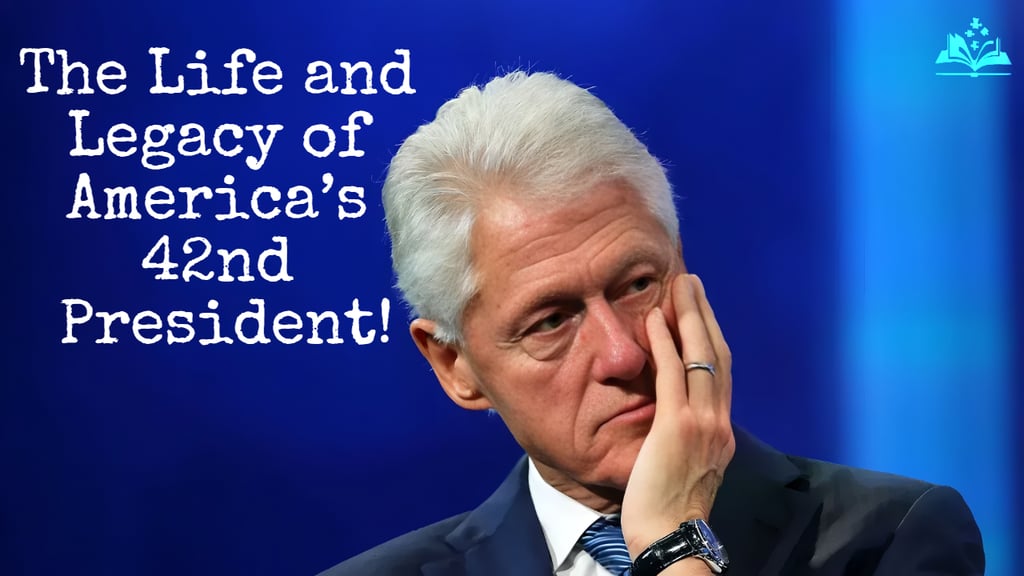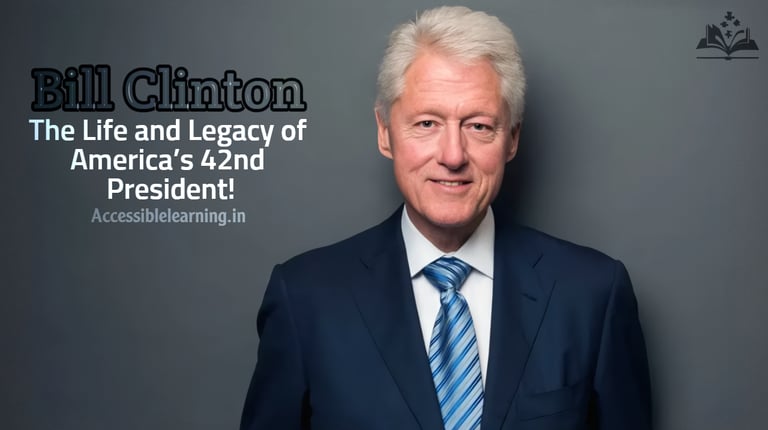
Bill Clinton: The Life and Legacy of America’s 42nd President?
Explore the life and legacy of Bill Clinton, the 42nd President of the United States. From his humble beginnings in Arkansas to his presidency marked by economic prosperity and global diplomacy, delve into his achievements, controversies, and enduring impact on American politics and global philanthropy.
USAPOLITICAL JOURNEYTHE GREAT LEADERBIOGRAPHYHARSH REALITY
Sachin K Chaurasiya
12/29/20247 min read


William Jefferson Clinton, known globally as Bill Clinton, served as the 42nd President of the United States from 1993 to 2001. He is widely remembered for his charismatic leadership, economic policies that ushered in prosperity, and his unique ability to connect with people. His life story, from his modest beginnings in Arkansas to his time as a global philanthropist, reflects a complex and multifaceted legacy filled with both triumphs and controversies.
Early Life and Education
Bill Clinton was born on August 19, 1946, in the small town of Hope, Arkansas, to Virginia Dell Cassidy and William Jefferson Blythe III. Tragically, his father, a traveling salesman, died in a car accident just three months before Clinton was born. His mother remarried Roger Clinton Sr., whose name Bill later adopted, although their relationship was marred by domestic strife.
Despite a difficult childhood, Clinton displayed exceptional academic abilities and a deep interest in public service. A turning point came in 1963, when he met President John F. Kennedy during a Boys Nation trip to the White House. This encounter cemented his ambition to pursue a life in politics.
Clinton graduated from Georgetown University in 1968 with a degree in International Affairs. While at Georgetown, he worked as an intern for Senator J. William Fulbright, a prominent critic of the Vietnam War, which influenced Clinton’s views on international diplomacy.
As a Rhodes Scholar, he attended Oxford University from 1968 to 1970, studying philosophy, politics, and economics. Clinton later attended Yale Law School, where he met Hillary Rodham, his future wife and an influential political partner.
Early Political Career
After completing his education, Clinton returned to Arkansas, where he began teaching law at the University of Arkansas. He entered politics in 1974 with an unsuccessful bid for Congress. However, his charisma and progressive policies resonated with voters, and he was elected Attorney General of Arkansas in 1976.
At the age of 32, Clinton became one of the youngest governors in U.S. history when he was elected Governor of Arkansas in 1978. Although his first term was marked by some missteps, such as increased automobile registration fees, Clinton regained the governorship in 1982 after losing re-election in 1980. Over the next decade, he earned a reputation as a pragmatic and reform-minded leader, focusing on education, healthcare, and economic development.
The 1992 Presidential Campaign
Clinton announced his candidacy for president in 1991, positioning himself as a "New Democrat" who could bridge the gap between liberal and conservative ideologies. His campaign emphasized themes like economic growth, healthcare reform, and addressing middle-class concerns.
The 1992 election was held against the backdrop of a faltering economy, and Clinton's message of change resonated with voters. Despite controversies, including allegations of marital infidelity and draft evasion during the Vietnam War, Clinton defeated incumbent President George H. W. Bush and independent candidate Ross Perot, securing the presidency with 370 Electoral College votes.
Presidency: 1993–2001
Bill Clinton’s presidency is remembered as a time of significant economic growth, bipartisan legislative achievements, and notable foreign policy initiatives. However, it was also marred by scandals and controversies.
Economic Growth and Fiscal Responsibility
Clinton presided over one of the most prosperous periods in U.S. history. His administration’s policies contributed to:
The creation of over 22 million jobs.
The lowest unemployment rate in decades, reaching 4% by the end of his term.
A historic budget surplus, achieved through a combination of tax increases on the wealthiest Americans, spending cuts, and economic expansion.
Welfare Reform
The Personal Responsibility and Work Opportunity Reconciliation Act of 1996 overhauled the U.S. welfare system, introducing work requirements and devolving control to individual states. The legislation aimed to reduce dependency on government assistance and encourage employment.
Crime Reduction
The Violent Crime Control and Law Enforcement Act of 1994 provided funding for 100,000 new police officers and crime prevention programs. While it contributed to a reduction in crime rates, critics argue that it also led to increased incarceration rates, disproportionately affecting minority communities.
Trade and Globalization
Clinton championed free trade, signing the North American Free Trade Agreement (NAFTA), which created a trilateral trade bloc between the U.S., Canada, and Mexico. While it boosted trade and economic integration, it also faced criticism for its impact on American manufacturing jobs.
Healthcare and Social Policies
Though his ambitious healthcare reform plan failed to pass Congress, Clinton successfully introduced smaller-scale initiatives like the Children’s Health Insurance Program (CHIP), which provided coverage to millions of uninsured children.
Environmental Policies
Clinton prioritized environmental protection, establishing over 20 new national monuments and signing the Kyoto Protocol, a global treaty aimed at reducing greenhouse gas emissions, though the U.S. Senate never ratified it.


Foreign Policy Achievements
Peace in Northern Ireland
Clinton played a crucial role in brokering the Good Friday Agreement in 1998, which ended decades of conflict in Northern Ireland.
Middle East Peace Process
His administration facilitated the Oslo Accords and hosted several high-profile summits aimed at resolving the Israeli-Palestinian conflict, although lasting peace remained elusive.
Intervention in the Balkans
Clinton led NATO’s military intervention in the Kosovo War to stop ethnic cleansing, solidifying his commitment to human rights on the global stage.
Strengthening U.S.-China Relations
Clinton worked to integrate China into the global economy, granting it most-favored nation status and supporting its entry into the World Trade Organization.
Scandals and Impeachment!
The most significant challenge to Clinton’s presidency was the Monica Lewinsky scandal, in which he was accused of lying under oath about his relationship with the White House intern. This led to his impeachment by the House of Representatives in 1998 on charges of perjury and obstruction of justice. However, the Senate acquitted him, allowing him to complete his term. Despite the scandal, Clinton left office with a 65% approval rating, one of the highest for a departing president.
Post-Presidency: A Life of Philanthropy and Public Service!
Since leaving office in 2001, Clinton has focused on philanthropy through the Clinton Foundation, which addresses global challenges such as
Combating HIV/AIDS and other diseases.
Promoting sustainable development.
Tackling climate change.
In partnership with the Clinton Global Initiative (CGI), he has mobilized billions of dollars in funding for various causes.
Clinton has also authored several books, including his memoir "My Life" (2004) and co-authored a mystery novel, "The President is Missing" (2018), with author James Patterson.
Clinton's New Democrat Identity
Bill Clinton's political philosophy was shaped by the Democratic Leadership Council (DLC), which promoted centrist policies to make the Democratic Party more appealing to moderates and conservatives. He branded himself as a "New Democrat," focusing on fiscal responsibility, welfare reform, and free trade—breaking away from the traditional liberal policies of the party. This approach helped redefine the Democratic Party during the 1990s.
The Clinton Health Care Reform Effort
One of Clinton’s most ambitious domestic policy initiatives was healthcare reform, spearheaded by First Lady Hillary Clinton. The plan aimed to provide universal healthcare coverage, but it faced staunch opposition from Republicans and healthcare industry stakeholders. Despite its failure, the effort set the stage for future healthcare reforms, such as the Affordable Care Act under Barack Obama.
Technology and the Internet Boom
The Clinton presidency coincided with the dot-com boom, a period of rapid technological advancement and internet expansion. His administration encouraged innovation and economic modernization, which contributed to the rise of Silicon Valley and the global tech industry.
Focus on Education
Clinton’s administration prioritized education, implementing programs like Goals 2000, which aimed to raise national educational standards, and expanding federal support for college students through Pell Grants and the creation of AmeriCorps, a national service program.


Foreign Policy Complexities
Somalia Intervention: The U.S. mission to restore stability in Somalia ended in tragedy with the Black Hawk Down incident in 1993, raising questions about U.S. involvement in humanitarian interventions.
Rwanda Genocide: Clinton’s administration faced criticism for its failure to intervene during the 1994 Rwandan Genocide, despite the mass loss of life. In later years, Clinton publicly expressed regret for this inaction.
Iraq and Terrorism: Clinton maintained sanctions against Iraq and conducted limited military strikes against Saddam Hussein’s regime. His administration also dealt with early signs of global terrorism, including the 1998 U.S. embassy bombings in Africa, which were linked to al-Qaeda.
Clinton’s Role in the Democratic Party Post-Presidency
After leaving office, Clinton became an influential figure in the Democratic Party, campaigning for candidates and advising on policy matters. His charisma and popularity helped bolster the political careers of leaders like Barack Obama and Joe Biden.
Personal Scandals Beyond the Presidency
While the Monica Lewinsky scandal is the most famous controversy of his life, Clinton has also faced allegations of impropriety in connection with his foundation and friendships with controversial figures like Jeffrey Epstein. These have occasionally cast a shadow on his philanthropic work.
Awards and Recognition
He was awarded the Presidential Medal of Freedom in 2013 by President Barack Obama for his humanitarian efforts.
He received honorary degrees from prestigious institutions like Oxford University, Yale University, and Georgetown University.
The Clinton Foundation's Global Reach
The Clinton Foundation, founded in 2001, has had a significant global impact:
Distributed over 3.9 million tons of food through its Clinton Health Access Initiative.
Played a key role in reducing the cost of HIV/AIDS treatments in developing countries.
Address climate change through initiatives promoting renewable energy and sustainable practices.
Pop Culture and Clinton’s Charisma
Bill Clinton’s charm extended beyond politics. Known for his talent on the saxophone, Clinton appeared on shows like The Arsenio Hall Show, where he performed and connected with younger audiences. This blend of relatability and leadership made him a cultural icon of the 1990s.
Post-Presidency Health Challenges
Clinton has faced several health issues, including undergoing quadruple bypass surgery in 2004 and later receiving stents. These health concerns motivated him to adopt a plant-based diet and advocate for healthier lifestyles.
Clinton’s Enduring Legacy
Bill Clinton's presidency is remembered for its blend of economic prosperity, pragmatic governance, and global diplomacy. While his legacy is complicated by personal controversies, his ability to connect with people and achieve bipartisan success has solidified his place as one of the most influential leaders of the late 20th century.
Bill Clinton’s presidency is often viewed as a "bridge to the 21st century", navigating America through the end of the Cold War and into a new era of globalization, technological innovation, and economic transformation. While his legacy remains mixed due to personal scandals, his policies and leadership continue to influence U.S. governance and the global stage.
Today, Clinton continues to inspire debates about leadership, governance, and the complexities of public service, embodying both the promise and pitfalls of modern American politics.
Subscribe To Our Newsletter
All © Copyright reserved by Accessible-Learning Hub
| Terms & Conditions
Knowledge is power. Learn with Us. 📚


